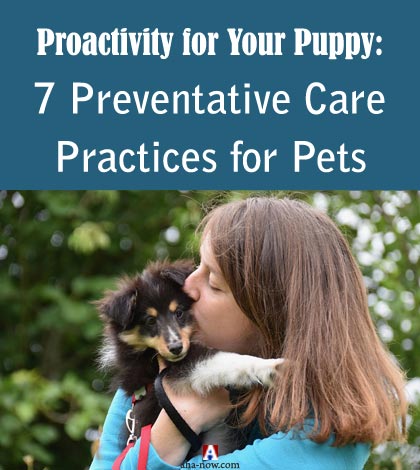
You’re like a parent to your pet puppy, so you should take good care of your puppy that is not limited to all the love, comfort, and attention you give them. As a proactive pet parent, it is your responsibility that your puppy is vaccinated in time, gets oral care and a quality diet, and much more. Here are the preventative cares you should give as a pet owner to ensure that your puppy remains healthy and cherishes its golden years of life. ~ Ed.

As a pet owner, pampering your furry friend through their beloved puppy years is a must. Whether you choose to prepare puppy-friendly ice-pops, treat your canine companion to a light paw massage, or splurge on the latest in dog accessories, the choice is up to you.
Memory foam dog beds and luxury leather collars aside, puppy pampering sessions should take second to your dog’s health. From offering a healthy diet to providing plenty of exercises, prolonging your pup’s lifespan should be a top priority. In addition to ensuring a good quality of life, keeping your pets healthy also saves you big bucks by avoiding costly vet expenses.
Should you fall short in the preventive care category, your puppy pal may be at risk of excessive weight gain, diabetes, or arthritis. With the possibility of these conditions shaving off precious dog years, begin preventative care as early as possible to prevent medical crises that traumatize both your pet and your wallet. Otherwise, emergency runs to the 24-hour pet clinic may be in your furry friend’s forecast.
7 Preventative Pet Care Healthy Habits of Pet Owners
Practicing preventative pet care is easier than you think. Here are seven healthy habits every pet owner should do to promote their furry friend’s well-being.
Stocking Up on Supplements
Even if you aren’t taking care of a senior dog, you should still be giving your animals a joint supplement. While your pet might not be suffering from pain currently, offering a joint supplement for dogs ensures they can run and play as they age. Dog owners with active breeds must be particularly strict with a supplement regimen and start as early as 12 months.
If you own a pet prone to arthritis or hip dysplasia, start incorporating a daily joint supplement into your dog’s diet as soon as possible.
Vaccinations
Failing to keep up on your pet’s vaccinations might result in contracting a life-threatening disease down the road. Most vaccinations should be given when your dog is a few weeks old and followed by boosters within a year.
Start by consulting your vet right after adoption and preparing with the proper knowledge of your pet’s behavior. Your vet will inquire about how much time your pet spends outside and their relationships with other animals residing in your home.
Parasite Control
Vaccinations protect your pet from harmful diseases, but they can still have run-ins with dangerous parasites. While most parasites cause internal or external irritation, others can threaten your dog’s health. The most common way a parasite will contact your pet is through feces or contaminated soil.
To reduce the risk of passing parasites between humans and animals, properly bag and dispose of dog poop. Make sure to wash hands thoroughly afterward, especially when around young children or at-risk groups.
Spay or Neuter
Getting your puppy fixed decreases the risk of contracting tumors or genital diseases. Additionally, pets that aren’t spayed or neutered are more likely to wander and get injured in the process. It’s best to fix your dog before reaching maturity to prevent urine marking, fighting, and pregnancy.
Provide a Quality Diet
The average pet food contains unnecessary ingredients and is sometimes even harmful. Make sure to carefully read the labels on store-bought dog food or opt for a raw diet.
Before you make any changes to your pet’s food, make sure to consult with a veterinarian. Some breeds are prone to urinary issues or heart malfunctions and may require a prescribed diet.
Offer Plenty of Exercises
Keeping your pup active is essential for strong muscles and a healthy weight. The duration and intensity of activity needed vary between breeds. Working dogs require at least twenty minutes of exercise a day, while other breeds might be over-exerted by that long of a workout.
Oral Care
Unfortunately, two-thirds of all pets contract a dental disease. Reduce the chance of infection by practicing good oral care like regular cleanings and vet exams. If possible, introduce a daily dental routine to your dog at its earliest stage. By brushing their teeth regularly and providing dental chews, your pets will have pearly whites well into their adult years.
Get Pet Insurance
In the case of an injury or sickness, pet insurance is invaluable. Several national insurance programs will reimburse you for costly vet bills and make a difference between quality care and financial disaster.
Wrapping up
Your four-legged friend is a valuable part of the family. With the proper preventive care, you can preserve that precious puppy energy and watch your dog take their golden years in stride.
If the thought of your puppy receiving a chronic disease diagnosis is enough to send you into a tizzy, implement these preventative care practices into your canine companion’s day-to-day routine. With oral hygiene and well-balanced diets at the forefront of your focus, your puppy will be bright-eyed and furry-tailed through every stage of life.
Over to you
Are you up to date on your pup’s vaccinations? Have you adequately prioritized preventative care best practices like routine grooming, dental cleanings, bloodwork, and heartworm testing? If not, it’s time you stopped dropping the ball so that Fido can get back to his games of fetch. Share your thoughts and views in the comments section.


